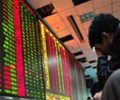Asian shares sink as caution over Trump-Xi deal, BOJ decision hits yen

Asian shares moved up and down on Thursday after US President Donald Trump said he had made a deal with Chinese President Xi Jinping on rare earths and tariffs, while the yen weakened after the Bank of Japan kept interest rates on hold.
After a nearly two-hour meeting with Xi, Trump said he agreed to reduce tariffs on imports from China in return for Beijing resuming purchases of US soybeans, keeping rare earth exports flowing and cracking down on the illicit trade in fentanyl.
Xi urged further cooperation in comments carried by Chinese state media after the meeting, while the Commerce Ministry later said it would suspend some countermeasures for a year.
But the market sold off, as traders worried that the tariff reduction between the two superpowers would quickly pass. Previous trade negotiations showed a promising start but then experienced setbacks.
The MSCI index covering Asia-Pacific shares outside Japan (.MIAPJ0000PUS) reversed an earlier gain of 0.5% into late trading to fall 0.5%, while U.S. S&P 500 e-mini futures fell 0.1% after earlier gains eased.
In early European trading, pan-regional futures were last up 0.2%, Germany’s DAX futures were up 0.3% and FTSE futures slipped 0.1%.
“The meeting represents a tactical pause or temporary de-escalation, not a structural breakthrough,” said Masahiko Loo, senior fixed income strategist at State Street Investment Management in Tokyo.
“The market is considering continued dialogue and tactical cooperation, but remains skeptical of any grand bargain,” he added. “A change in attitude, especially from Trump, could quickly reignite tariff threats and fuel risk-off sentiment.”
Global markets are also in the midst of a series of central bank decisions that will provide clues about the future direction of interest rates.
Although the Bank of Japan kept interest rates as expected, it repeated its pledge to continue raising borrowing costs if the economy moves in line with its projections.
“The BOJ is preparing to raise interest rates,” said Fred Neumann, chief Asia economist at HSBC in Hong Kong. “With the opportunity lost in October to push rates higher, all eyes are now on December, when a rate hike is likely.”
The Nikkei 225 fluctuated between gains and losses after the Bank of Japan decision but posted a record close.
The yen had strengthened earlier after remarks by US Treasury Secretary Scott Bessent calling for faster interest rate hikes to avoid weakening the currency too much.
But Japan’s currency slipped 0.5% against the US dollar, last trading at 153.46 yen per dollar, the yen’s weakest level since February, and weakened 0.6% to hit a record 178.31 against the euro.
The yen’s decline accelerated as BOJ Governor Ueda said he did not think “there is a risk of falling behind the curve” on monetary policy, and remained cautious about the timing of the central bank’s next rate hike at a news conference in Tokyo.
The Federal Reserve cut interest rates on Wednesday by a quarter of a percentage point as expected, but the US central bank’s new policy statement included several references to the lack of official data during the ongoing federal government shutdown, and Fed Chair Jerome Powell later told reporters that policymakers were likely to be more cautious if this deterred them from further jobs and inflation reports.
The comments prompted traders to cut their forecasts for a 25 basis point cut in the US central bank’s interest rates in December, which was previously seen as almost certain. Fed funds futures now imply a 67.8% chance that the Fed will keep interest rates on hold at its next meeting on Dec. 10, compared with a 9.1% chance on Wednesday, according to CME Group’s FedWatch tool.
The yield on 10-year US Treasury bonds was last at a three-week high of 4.0776%, up 1.96 basis points compared to the previous close of 4.058%.
The dollar index, which measures the greenback’s strength against a basket of six currencies, retreated from a two-week high, down 0.1% at 99.075. Gold was last up 0.91% at $3,965.29 an ounce.
The euro was up 0.2% at $1.16215 ahead of the European Central Bank’s policy decision later today, which is expected to keep interest rates on hold for a third straight meeting.
Elsewhere, the KOSPI index maintained its gains after paring gains as much as 1.6% after Trump and South Korean President Lee Jae Myung finalized details of a trade deal, and was last up 0.1%.
Samsung Electronics shares jumped 3.6% after reporting on Thursday a 32% rise in third-quarter operating profit.
The corporate earnings season is sparking renewed unease among investors about the cost of building AI, even as the U.S. economy still appears to be in unhealthy shape, putting pressure on megacap technology stocks that carry the largest weighting in the S&P 500 Index.
Meta on Wednesday forecast “much larger” capital spending next year as its revenue beat market estimates, while Microsoft spending on artificial intelligence infrastructure surged to a record of nearly $35 billion in the September quarter. Shares of both companies slumped.
However, rival tech giant and Google parent Alphabet bucked the trend, with shares rising in after-hours trading after beating earnings expectations.
In energy markets, Brent crude was last down 0.5% at $64.62 a barrel.
Source: Reuters
